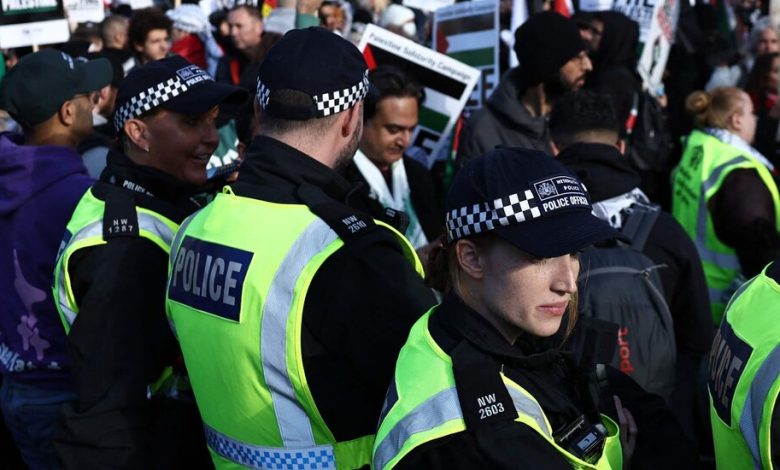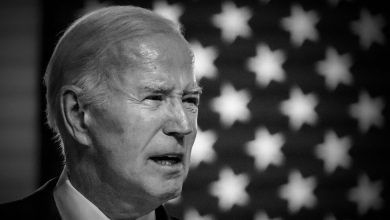In Britain, Reality Is Cleaving in Two

In Britain, Armistice Day is usually an understated affair, marked only by two minutes of silence at 11 a.m. This year was considerably more eventful, as two very different protests descended on London.
One, composed of hundreds of thousands of people calling for a cease-fire in Gaza, snaked peacefully through the west of the city and over the River Thames — a patchwork of red, green, white and black. The other, comprising a few hundred people from Britain’s far right and football hooligan networks, gathered several miles away in Westminster. Ostensibly there to defend a key national war memorial from the peace marchers, the group clashed with Metropolitan Police officers. By the day’s close, 145 people, most of them right-wing counterprotesters, had been arrested.
Behind the tumult stood Suella Braverman. As home secretary, she spent days pressuring Britain’s top security officials to ban the pro-Palestinian demonstrations, which she denigrated as “hate marches.” When that proved unsuccessful, she published an article — apparently not authorized by Prime Minister Rishi Sunak — accusing the police of bias, an incendiary intervention that has been widely blamed for bolstering the far-right presence in central London on Saturday. Mr. Sunak sacked her on Monday. Her departure was quickly overshadowed by the shock return to frontline politics of the former prime minister David Cameron, the architect of austerity and Brexit.
For all her extremist posturing, Ms. Braverman is part of an establishment consensus that firmly backs Israel’s war in Gaza. At the same time, as the humanitarian catastrophe in the enclave worsens, a mass grass-roots movement calling for a cease-fire is gaining strength, backed by much of the country. Yet Westminster’s leaders remain unmoved in their support for Israel’s military campaign. In Britain, as its politicians and public move away from each other, reality is cleaving in two.
Protests began almost as soon as Israel, in response to the Hamas attacks on Oct. 7, started its aerial bombardment of Gaza. Five weeks later, protesters are still waiting for politicians to grasp the extent of the nightmare. Led by Palestinian campaign groups, peace activists and trade unionists, an extraordinary number of people have turned out across the country. Despite a divergence in the attendance figures given by organizers and the police, the protest movement is unquestionably Britain’s largest in 20 years. It’s also employing diverse methods: Alongside weekly Saturday marches in London, there have been sit-ins, rallies and arms factory blockades.
From the beginning, these actions have been greeted by suspicion and outright smears from influential figures across Britain’s political and media landscape. Their main charge is that those who oppose Israel’s campaign are antisemitic — an accusation that does nothing to quell real rising antisemitism in the country and does everything to further inflame divisions. While demonization of the marches has muddied public support for those taking to the streets, it has not dampened support for their central demand. An overwhelming majority of Britons back a cease-fire.
But not Britain’s politicians. Only one political leader of the nations that make up Britain has called for a cease-fire: Humza Yousaf, the first minister of Scotland, who had family members in Gaza. His Welsh counterpart, Mark Drakeford, had no such conviction. Most significant, both Mr. Sunak and Keir Starmer, the leader of the opposition Labour Party, have refused to support a cease-fire, instead endorsing a humanitarian pause.
This phrase, nonexistent in British political parlance weeks ago, has quickly become a well-worn refrain, brandished as a shield by those in Westminster. The likes of Mr. Sunak and Mr. Starmer clearly hope their support of a pause — a feeble demand that pretends toward acknowledgment of the terrible devastation visited on civilians in Gaza — will fend off criticism of their refusal to call for a cease-fire and their dogged insistence that Israel’s assault on Gaza is one of self-defense.
For Mr. Sunak, such an approach is perhaps unsurprising. The Conservative Party, after all, has long tied itself to Israel, and the current crop of lawmakers has shown little interest in demonstrating moral leadership. Expectations for something different from Mr. Sunak — who is effectively a lame duck, heading toward near-certain electoral defeat next year — were low.
It’s a different story for Mr. Starmer, who made his reputation as one of Britain’s top human rights lawyers. He has built his pitch to be Britain’s next prime minister on his image as a judiciocrat. A former director of public prosecutions, he has distanced himself from a succession of ethically dubious Conservative leaders by extolling his own virtues as a faithful disciple of law and order, one whose moral compass is permanently pointed due north.
So his coyness on whether United Nations and European Union experts are correct in their assessment that Israel’s war on Gaza violates international law — and could even, in the words of a United Nations human rights expert, amount to ethnic cleansing — has been viewed as a profound act of ethical bankruptcy. There was widespread outrage when, in an October interview, Mr. Starmer appeared to suggest that Israel “has the right” to withhold food and water from Palestinian civilians in Gaza. His difficulties have only deepened since.
Around 50 local Labour councilors across Britain have left the party in protest against Mr. Starmer’s stance. Multiple members of his frontbench team, too, are reportedly on the brink of resignation; one shadow minister, Imran Hussein, jumped ship last week. Pressure from constituents is also growing: Labour lawmakers say they have been inundated by correspondence questioning the party’s position. On Wednesday, 56 of them broke ranks to vote for a cease-fire motion in Parliament. Labour’s extensive polling lead over the Conservatives has not yet been affected, but Mr. Starmer’s principles and leadership style are under scrutiny as never before.
For now, the furor around the government reshuffle may give Mr. Starmer breathing space. Tory dysfunction is back at the top of the news, safe ground for Britain’s commentariat. As the papers pored over Mr. Cameron’s bombshell return, Gaza City’s biggest hospital, Al-Shifa, was becoming a living tomb. Doctors trapped there by heavy fighting shared images of premature babies in their care: Removed from incubators after oxygen supplies were exhausted, their frail forms were stark against turquoise blankets.
In the sight of such horror, Britain’s politicians avert their gaze. But its public is bearing witness.
Moya Lothian-McLean (@mlothianmclean) is a contributing editor at Novara Media and a freelance journalist.
The Times is committed to publishing a diversity of letters to the editor. We’d like to hear what you think about this or any of our articles. Here are some tips. And here’s our email: [email protected].
Follow The New York Times Opinion section on Facebook, Twitter (@NYTopinion) and Instagram.





